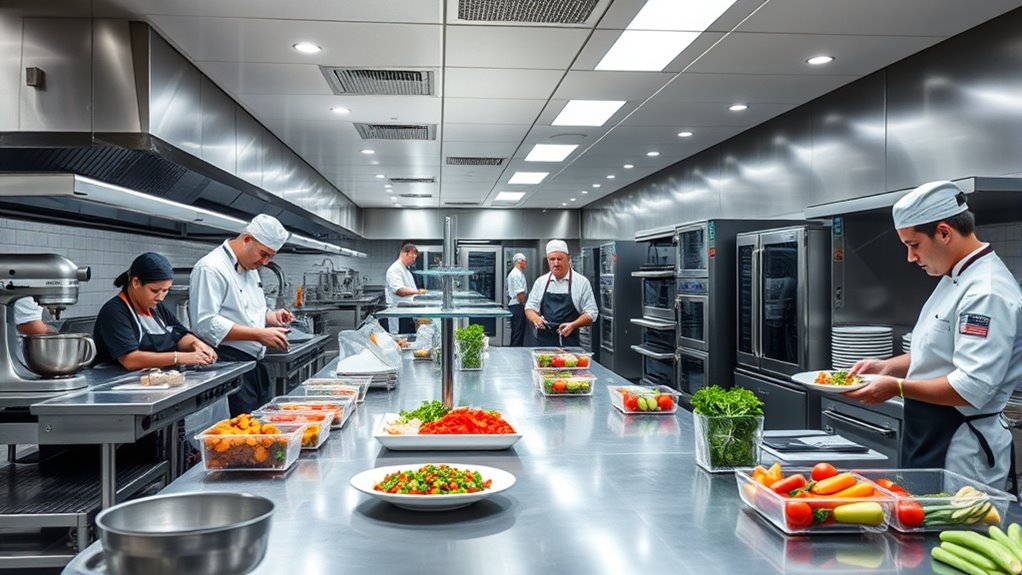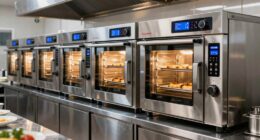A commissary kitchen is a licensed, shared space where food entrepreneurs like you can prepare, package, and store products in compliance with health standards. It’s equipped with commercial appliances and offers flexible rental options to help reduce startup costs. This environment fosters networking and collaboration with other vendors, making it easier to grow your business. Want to learn how a commissary kitchen can support your food venture? Keep exploring to find out more.
Key Takeaways
- A commissary kitchen is a licensed shared space designed for food production and preparation.
- It provides access to commercial-grade equipment and amenities for multiple food vendors.
- The facility ensures food safety compliance through sanitation protocols and temperature-controlled storage.
- It offers a cost-effective alternative to standalone commercial kitchens, supporting startup and growing food businesses.
- A commissary fosters community, networking, and collaboration among food entrepreneurs.

Ever wondered how aspiring food entrepreneurs turn their ideas into reality? It all starts with understanding what a commissary kitchen is and how it can help you succeed. A commissary kitchen is a licensed, commercial space designed for food production, often shared by multiple vendors. These shared facilities provide a safe, compliant environment where you can prepare, package, and store your food products without the hefty investment of opening your own commercial space. For someone just starting out, this setup offers the perfect balance of affordability and professionalism, giving you a real edge in the competitive food industry.
A commissary kitchen is a licensed, shared space for food production that boosts startup success.
One of the most critical aspects of working in a commissary kitchen is maintaining food safety. Since these facilities serve multiple businesses, strict protocols are in place to prevent cross-contamination and ensure your food meets health standards. You’ll find that shared facilities are equipped with exceptional sanitation stations, temperature-controlled storage, and cleaning schedules designed for maximum safety. This means you don’t have to worry about the logistics of maintaining food safety on your own — the commissary handles that, so you can focus on perfecting your recipes and scaling your brand.
Using shared facilities also means you gain access to equipment and amenities you might not be able to afford on your own, like commercial ovens, mixers, and refrigeration units. This setup enables you to produce larger quantities efficiently, without the hefty upfront costs of purchasing and maintaining such equipment. Plus, many commissaries offer flexible rental options, allowing you to book time slots that fit your production schedule. This flexibility is especially beneficial if you’re juggling multiple roles or testing new recipes.
Another advantage is the collaborative environment within a commissary kitchen. You’re surrounded by other food entrepreneurs, which creates opportunities for networking, sharing tips, and learning from each other’s experiences. It’s a community where you can troubleshoot issues related to food safety, packaging, or distribution, often with the guidance of staff who understand the nuances of commercial food production.
In essence, a commissary kitchen acts as your launchpad, providing a compliant, well-equipped, and cost-effective space for you to bring your culinary ideas to life. It simplifies the complexities of food safety and shared facilities management, so you can focus on what you love — creating incredible food that stands out in the marketplace. Whether you’re just starting out or looking to expand, understanding how a commissary kitchen works can make all the difference in turning your passion into a thriving business.
Frequently Asked Questions
How Much Does It Cost to Rent a Commissary Kitchen?
Renting a commissary kitchen typically costs between $15 and $30 per hour, but rates vary based on location considerations. You should compare costs in different areas to find the best deal, as prices can fluctuate depending on the size, amenities, and proximity to your business. Keep in mind that some kitchens offer discounted rates for longer-term rentals or regular use, helping you manage costs effectively.
What Are the Requirements to Lease a Commissary Kitchen?
When leasing a commissary kitchen, you need to meet food safety standards and licensing requirements. For example, Sarah, a caterer, guaranteed her kitchen passed health inspections and obtained proper permits before leasing. You typically need proof of liability insurance, a valid business license, and compliance with local health codes. Make sure your equipment is up to code and that you’ve completed any necessary food safety certifications.
Can I Operate My Business From Multiple Commissary Kitchens?
Yes, you can operate your business from multiple commissary kitchens, but you must guarantee each location adheres to food safety standards and licensing compliance. You’ll need proper documentation and inspections for each site, maintaining consistent quality and safety protocols. Keep detailed records and coordinate schedules to avoid cross-contamination. By doing so, you protect your brand, meet legal requirements, and ensure your operations run smoothly across all commissary kitchens.
Are Commissary Kitchens Available for Short-Term Use?
Like a rental car, commissary kitchens often offer short-term rentals, giving you flexible access whenever you need it. You can book these kitchens for a day, a week, or even just a few hours, making them perfect for short-term projects or emergencies. Many facilities understand your needs and provide easy, on-demand options so you can focus on your food business without long-term commitments.
What Types of Food Businesses Are Allowed in Commissary Kitchens?
You can use commissary kitchens for various food businesses, including catering, bakers, and food trucks. Before starting, verify your business complies with food safety standards and licensing requirements. These kitchens are designed to meet health regulations, so you must follow proper sanitation and storage protocols. Check local laws, get necessary permits, and maintain documentation to operate legally. This way, your business stays compliant and safe for customers.
Conclusion
So, now you see that a commissary kitchen is a modern marvel for food entrepreneurs, offering a shared space to cook, store, and sell your creations. Think of it as your trusty sidekick in the culinary quest, much like Robin to Batman. Whether you’re just starting out or scaling up, it’s the perfect place to craft your culinary masterpiece without the hassle of owning a full-blown eatery. It’s a game-changer, plain and simple!









